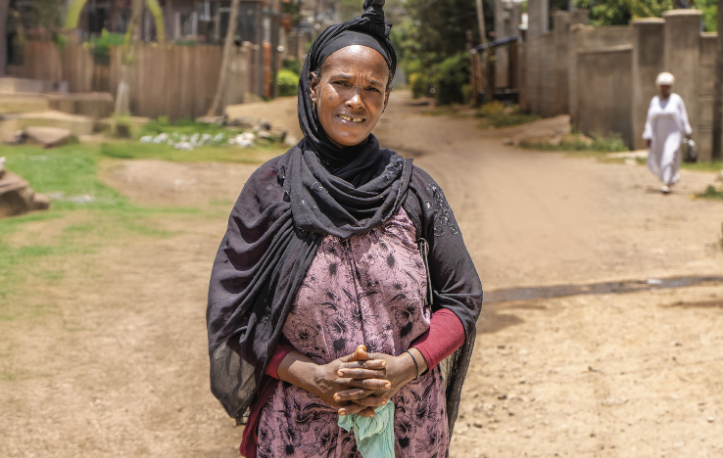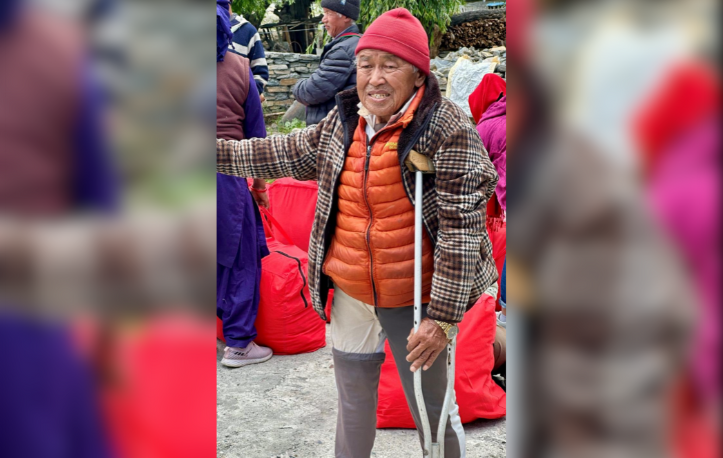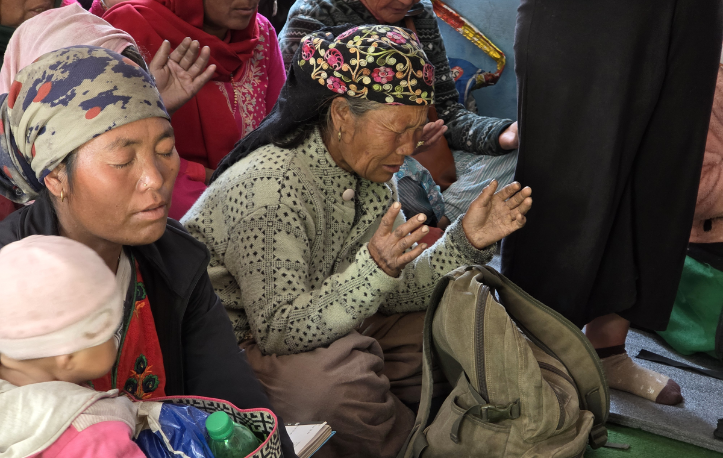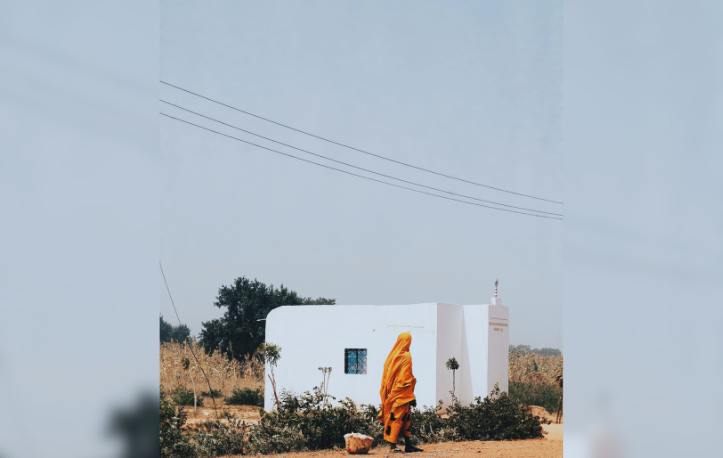Hearing the gospel of Christ changed Damitu’s life. In 2005, when she was still a teenager, Damitu married a local leader of the traditional Ethiopian religion Waaqeffanna, which is widely practised by members of the Oromo tribe. Her husband, Bikila, who was a few years older, frequently travelled into the forest to kill and ritually sacrifice animals or make other offerings to the god of Waaqeffanna.
After learning about Jesus Christ, however, Damitu urged her husband to stop. “I told him that we should not continue following this god,” she said, “because the God that we heard about recently saves people freely and He doesn’t receive any kind of food or money.”
Bikila liked the idea of not having to provide expensive offerings, so he stopped practising the tribe’s religion. But the decision angered his family, who, along with others living in parts of central, southern and western Ethiopia, consider Waaqeffanna an essential element of Oromo tribal identity.
“The number of people following this traditional belief system has increased over recent years with the growth of the Oromo independence movement,” a front-line worker said. According to the worker, the Oromo Liberation Army (OLA) has been radicalising young men to violently oppose the Ethiopian government. “One of their tenets is that every Oromo should practise Waaqeffanna,” he said, “and those that don’t are considered traitors to their people.” Islam is also expanding in the Oromo regions, and many Muslims practise Waaqeffanna alongside their Islamic beliefs.
Bikila’s family members were fervent adherents of Waaqeffanna, and his mother tried to persuade him and Damitu to return to their traditional tribal religion. But Damitu was determined to follow the God of the Bible. “If that god that we used to worship is a true god,” she replied, “he can hear our prayers just from here.” Damitu’s mother-in-law rebuked her, accusing her of being a bad wife.
About three weeks later, Damitu became very ill and asked a pastor to pray for her. “I repented, he prayed for me and then I recovered from my sickness,” she said. After that, Damitu and Bikila became fully devoted followers of Christ, the first in their village.
A Growing Threat
The entire village rejected Damitu and Bikila because of their Christian faith. They were excluded from community events, and when they needed help with chores like harvesting crops, normally a communal effort, they were forced to work alone. Then, about a year after they placed their faith in Christ, their neighbours’ rejection turned violent. Some villagers attacked and beat Bikila, destroying several small huts he had built and forcing him off his land.
But the couple persevered. One of Bikila’s uncles allowed them to live on and cultivate some of his land, and they continued to share the gospel with their neighbours. “I couldn’t hold the message inside,” Damitu said, “so I just continued talking.”
Eventually, Bikila sensed the Lord calling him to become a pastor, and in 2015, he and Damitu started a church in their home. They were encouraged as the church grew and they saw God’s work among its members. “God did very wonderful things in that village,” Damitu said.
Damitu continually encouraged the Christians to stand firm in their faith. “Saying ‘Jesus is Lord’ is not enough,” she said. “People should live according to the Christian God. We heard from the stories of the Bible that many of our fathers died and [were] slaughtered for the sake of the faith, so we need to pay attention to our faith and take it very seriously.”
The group of Christians eventually obtained a piece of land and built a place of worship on it. Over the years, Damitu and Bikila’s family grew to five children, and the church swelled to around 200 members.
Still, some members of the community viewed the growing church as a threat because it was drawing young people away from the tribe’s traditional beliefs. Church members were harassed by Oromo traditionalists nearly every time they walked to church. “They wanted … to fight with the Christians,” Damitu said, “but we were focusing on prayer.”
Instead of retaliating against their persecutors, the Christians prayed that they would either leave the area or join their church. A few did become followers of Christ, but others merely increased their intimidating behaviour. Bikila, as a leader of the church, became a particular target.
“You are the one who planted this church in this community,” they told Bikila. “You destroyed our traditional values.”
Bikila stood firm. “I don’t want to give up my faith,” he replied. “I [will] continue worshipping the Lord and also telling other people about the gospel.” Then the family received a final warning. They were told that if they did not recant their faith, they would be killed.
On a Sunday evening in March 2022, that threat was realised. Bikila had gone to bed early and Damitu was doing household tasks when five armed men burst into their home. Damitu recognised three of the young men as villagers who had joined the OLA. They hit her in the face and tied a rope around her neck before going into the bedroom where Bikila was sleeping with his children.
They shoved a gun into the side of his head and asked, “Can your Jesus save you right now?”
“Yes, He can [save] anyone, even you,” Bikila replied.
“Let’s see,” the men responded. Then they shot him in the head, killing him instantly.
As the family screamed and cried, the men began to mock Bikila’s faith. “You preached Jesus was raised from the dead, and now you are dead,” they said. “Let’s see you rise again!” The attackers then set fire to the home, burning all of the family’s possessions as a warning to the community of what could happen if they followed Christ.
Mourning and Restoring
After the attack, fear gripped the congregation, and few attended Bikila’s funeral. Even Damitu’s father chose not to attend, instead immediately pressuring her to marry a non-Christian man. Some family members blamed her for Bikila’s death. “They spoke bad things about me,” Damitu said. “[They said,] ‘You let your husband die; he is killed for his faith’.”
While Damitu wasn’t surprised that villagers continued to reject the Christian faith, she was shocked and hurt when most of the congregation stopped attending church. After praying about it, she decided to visit church members at their houses and ask them directly why they had chosen to leave the church.
“We know what happened to your husband,” they explained. “If we continue worshipping, they will do the same thing to us. We are afraid.”
Challenging them to remember their eternal home, Damitu told them, “We are aliens and strangers in this world, and this world doesn’t belong to us. God has different ways of taking His people to their … eternal home.”
Damitu also reminded them that we all die. “When the time comes, I will go to my Lord,” she said. “I am just waiting for my time, so don’t be afraid of death.”
One young man told her he was struggling because he knew that God had the power to protect Bikila but did not. Damitu encouraged the young Christian to consider the story of Job. “Even in the midst of sufferings and the different tests and challenges that we face,” she told him, “we need to continue believing in the Lord.”
She told him he needed to trust the Lord and leave the reason for tests and trials with Him. “When I was telling him this, we did not even [have] food and our possessions were burned,” she said. “We lost everything, but … I was happy regardless of the loss.”
Damitu’s encouragement prompted the young Christian to repent, and he and many other members soon returned to the church.
Repaying Evil with Good
Several months after her husband’s murder, Damitu learned that a younger brother of one of the killers had died of an illness. Though she was still grieving herself, Damitu showed Christ’s love to the family by taking them food and a gift of money to comfort and encourage them.
The entire community was amazed by Damitu’s kindness towards the family of one of Bikila’s killers. In Oromo culture, when families cannot resolve animosities, they become enemies and cease all contact.
“When people asked me about why I [would] do that,” she said, “I told them, ‘You know … you read in the Bible that when people hit one of your cheeks, you turn the other one. We need to show good things to other people. We need to bless those who curse us, those who attack us. In a way it is expressing our love to God because our God loves all people, and also he loved us. When we love other people, we are expressing that we are loving God’.”
As she showed kindness to those who had caused her great suffering, her family members and others continued to pressure her to leave her Christian faith. Again, she responded with mercy.
A man who had pressured her to return to their traditional religion developed a condition that made it difficult to speak, and doctors were unable to help him. When a relative took him to church to receive prayer, two young Christians told Damitu, “This guy is an opponent, so if … this person is not healed, we will be ashamed.”
Damitu urged them to leave it with God. “Don’t think like that,” she told them. “Our role is just to pray. God, Who is, blesses those who pray. We should trust in the Lord. We need to pray.”
The Christians prayed, and the man recovered from his condition. He asked Damitu to forgive him for the way he had treated her, and he is now active in the church.
The God Who Is Alive
Today, the church that Damitu and Bikila founded has doubled in size to about 400 people. Although none of Bikila’s killers has been arrested, Damitu said, “The believers are not afraid now.”
Damitu and her family still live in the house that Bikila built for them. She requests prayer that her children, three of whom were very young when their father was killed, will remain faithful to the Lord and will complete their education.
Though Damitu has struggled financially, the global body of Christ has helped her with living expenses and educational fees for the children. “We were abandoned in our community,” she said. “But God used people we had never met to remind us of His goodness.”
While expressing her thanks, Damitu burst into song. “Where is my enemy that threatened me?” she sang. “Now times have changed. I am free, God has made me free. My life has completely changed.”
Damitu said her children still grieve the loss of their father, but she encourages them to remember that he is home with their heavenly Father. “We will all go one day,” she said, “and death is just the part that gets us home. Bikila just went home earlier than most.”
Damitu said she often senses God speaking to her in a way that encourages her soul. “Whenever I am struggling with some issues in my life,” she said, “I hear a voice, but not an audible voice, that [says], ‘I am with you. I am your shield. I am alive and I am living’.”
Despite being made a widow, Damitu knows she is not alone. She is determined to keep praising and serving the God Who is alive and hears her prayers.




Submit a Prayer